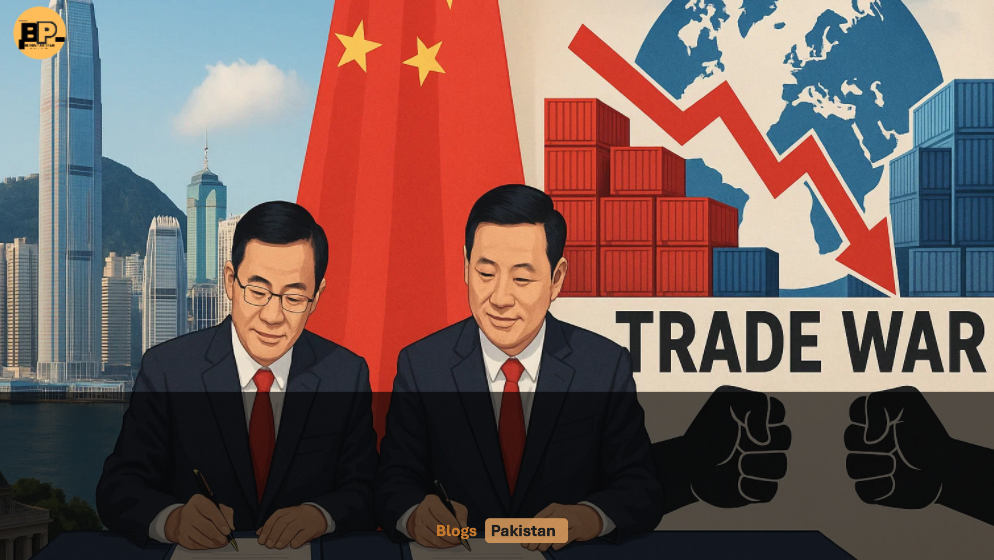Introduction
Move over, Hollywood—China is scripting its own blockbuster in the world of international diplomacy! In a bold move, Beijing has established an International Mediation Body in Hong Kong, aiming to rival heavyweights like the International Court of Justice (ICJ) and the Permanent Court of Arbitration.
But why should you care? Well, if you’ve ever watched two neighbors argue over a parking spot and wished for a neutral referee, this is that—but on a global scale. With rising tensions (especially between China and the U.S.), this new body could reshape how countries settle disputes. Plus, Hong Kong gets to flex its diplomatic muscles while boosting its economy.
Let’s break it all down—what this means for global trade, why Hong Kong was chosen, and how Pakistan and India fit into the picture.
Why Did China Launch This Mediation Body?
1. Geopolitical Tensions & Trade Wars
Remember when the U.S. and China were slapping tariffs on each other like it was a high-stakes poker game? Yeah, that didn’t end well for global markets. The U.S.-China trade war disrupted supply chains, spooked investors, and even made your favorite gadgets pricier.
China’s new mediation body is like a diplomatic “time-out” corner, where nations can hash out disputes before things escalate. Think of it as “The United Nations, but with fewer speeches and more problem-solving.”
2. Hong Kong’s Comeback as a Global Hub
Hong Kong has always been Asia’s financial darling, but recent political turmoil made some investors nervous. By hosting this new mediation powerhouse, China is sending a clear message: “Hong Kong is still open for business!”
John Lee, Hong Kong’s leader, claims this will boost the city’s economy, create jobs, and even help sectors like hospitality and transport. (Translation: More hotels, more flights, and hopefully, cheaper dim sum for tourists.)
3. Expanding China’s Global Influence
Some analysts see this as China’s soft power play. Instead of just being the world’s factory, Beijing wants a bigger say in global governance. If successful, this body could make China the go-to mediator for international conflicts—kind of like a diplomatic superhero (cape optional).
How Will This Mediation Body Work?
Types of Disputes It Will Handle
According to Chinese Foreign Minister Wang Yi, the body will tackle:
- Country vs. Country (Think border spats or trade disagreements.)
- Country vs. Foreign Nationals (Like when a government seizes a foreign company’s assets.)
- Private International Entities (Business disputes gone global.)
Who’s Backing It?
The signing ceremony saw reps from Pakistan, Indonesia, Laos, Cambodia, and Serbia, along with 20 international bodies (including the UN). That’s a pretty solid guest list!
Where’s the HQ?
The new body will set up shop in Wan Chai—a buzzing district in Hong Kong—inside a former police station. (Because nothing says “peaceful negotiations” like a building that once housed cops.) It’s expected to open by late 2025 or early 2026.
What’s in It for Pakistan and India?
For Pakistan: A Trusted Ally Gets a Bigger Role
Pakistan was among the first to back this initiative. Given its strong ties with China, this body could offer Islamabad a neutral platform to resolve disputes—especially with neighbors (cough India cough).
For India: A New Player in Conflict Resolution
India hasn’t joined yet, but if this body gains traction, it might be hard to ignore. With rising trade tensions globally, having an alternative to Western-dominated institutions could be tempting.
Will This Body Really Challenge the ICJ?
Hong Kong already ranks #2 (tied with Singapore) as a preferred arbitration hub, just behind London. But can it really compete with the International Court of Justice?
Pros:
- Faster resolutions (Courts take years; mediation could be quicker.)
- Less formal (No wigs, no Latin phrases—just solutions.)
- Economic perks for Hong Kong (More jobs, more global clout.)
Cons:
- Skepticism from Western nations (Will they trust a China-led body?)
- Potential bias concerns (Can it stay neutral in disputes involving Beijing?)
Final Verdict: A Bold Move, But Will It Work?
China’s new International Mediation Body is like opening a diplomatic McDonald’s—will the world buy it? If successful, it could:
✅ Reduce global tensions
✅ Boost Hong Kong’s economy
✅ Give Asia more say in global disputes
But if seen as too China-centric, it might struggle to gain trust. Either way, it’s a fascinating development—one that could reshape how nations resolve conflicts.










